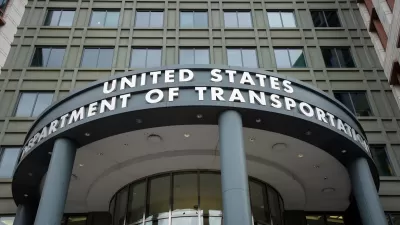The single most effective way a major employer in Seattle found to reduce solo driving was to charge employees for parking, but ruling-out monthly permits. An innovative method was adopted to charge workers on a daily basis

First, *credit goes to the city of Seattle for placing a requirement on the Bill & Melinda Gates Foundation when they approved the foundation's downtown headquarters in 2008: they "could no longer offer free parking and it had to reduce the number of employees who drove alone to work," reports David Gutman for The Seattle Times.
At the time, nearly 90 percent of Gates Foundation employees drove alone. A year after the new headquarters opened in 2011, the number was 42 percent. Last year it was 34 percent.
As one might imagine, the foundation's 1,200 full-time employees get plenty of perks to reduce drive-alone commuting, including free ORCA transit cards, bike-storage areas, locker and showers, and a financial incentive to use alternative transportation.
But the single biggest factor in reducing solo car commuting, the Gates Foundation found, doesn’t cost the foundation or its employees any additional money and is easily replicable at workplaces that have fewer resources to devote to the issue.
Charging for parking is critical, but some parking charges are counter-productive. Not only are monthly permits not available, the costs are 'front-loaded' so as to create the maximum incentive to reduce drive-alone commuting.
Every employee, from the CEO down, pays $12 a day to park in the Gates Foundation garage. Fees are capped at the neighborhood’s market rate — $120 a month. So, the first 10 days a month that an employee drives alone cost $12 each; every day the rest of the month is free.
Of course, there's a risk that the front-loaded system could backfire and encourage workers to to drive alone after having paid for ten days of parking. But parking data shows the system is working.
The Gates Foundation has more than 700 parking spots, between its own garage and spaces it leases. On a typical day, fewer than half of them get used.
*Seattle's parking requirement stems from a "1991 state law that requires Seattle and other metro areas in Washington to adopt plans to reduce the number of commuting trips made by employees at large workplaces, " writes Gutman. Eric Jaffe, the former New York bureau chief for CityLab, wrote about the Washington's Commute Trip Reduction program in April 2015, calling it a "model for the nation."
Hat tip to Darrell Clarke.
FULL STORY: The not-so-secret trick to cutting solo car commutes: Charge for parking by the day

Planetizen Federal Action Tracker
A weekly monitor of how Trump’s orders and actions are impacting planners and planning in America.

San Francisco's School District Spent $105M To Build Affordable Housing for Teachers — And That's Just the Beginning
SFUSD joins a growing list of school districts using their land holdings to address housing affordability challenges faced by their own employees.

The Tiny, Adorable $7,000 Car Turning Japan Onto EVs
The single seat Mibot charges from a regular plug as quickly as an iPad, and is about half the price of an average EV.

San Diego Votes to Rein in “Towering” ADUs
City council voted to limit the number of units in accessory buildings to six — after confronting backyard developments of up to 100 units behind a single family home.

Texas Legislature’s Surprising Pro-Housing Swing
Smaller homes on smaller lots, office to apartment conversions, and 40% less say for NIMBYs, vote state lawmakers.

Even Edmonton Wants Single Staircase Buildings
Canada's second most affordable major city joins those angling to nix the requirement for two staircases in multi-family buildings.
Urban Design for Planners 1: Software Tools
This six-course series explores essential urban design concepts using open source software and equips planners with the tools they need to participate fully in the urban design process.
Planning for Universal Design
Learn the tools for implementing Universal Design in planning regulations.
Borough of Carlisle
Smith Gee Studio
City of Camden Redevelopment Agency
City of Astoria
Transportation Research & Education Center (TREC) at Portland State University
City of Camden Redevelopment Agency
Municipality of Princeton (NJ)





























